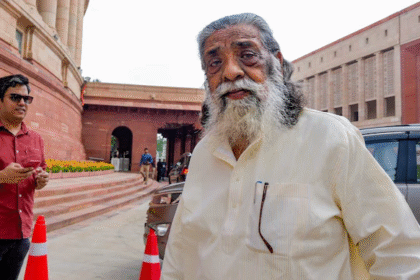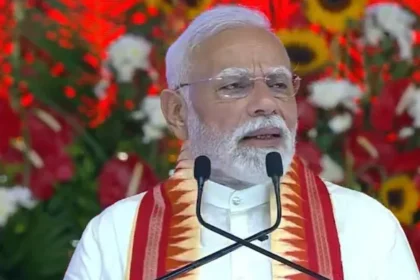Indian-Origin Chef Asma Khan Shines in Guinness World Record Anthem Featuring 195 Voices for Global Women Empowerment
Indian-Origin Chef Asma Khan Features in Guinness World Record-Breaking Song Promoting Gender Equality
In a remarkable demonstration of unity, inclusivity, and cultural empowerment, Indian-origin chef and restaurateur Asma Khan has been featured in a groundbreaking musical project titled “195,” which has officially entered the Guinness World Records for having vocal contributions from the most nationalities in a single musical recording. The project, launched during the 55th Annual Meeting of the World Economic Forum (WEF) in Davos-Klosters, Switzerland, in January 2024, brought together women from every one of the world’s 195 countries to contribute their voices in an unprecedented global anthem aimed at promoting gender equality.
The song is a brainchild of The Frequency School, a collective co-founded by Grammy-nominated and multi-platinum music producer Maejor, along with Martina Fuchs, Kingsley M, Brandon Lee, and Aaron Dawson. Their mission is to leverage the transformative power of sound—particularly sound healing frequencies—to foster global change. By assembling women from every corner of the globe, the team not only achieved a historic musical feat but also amplified a powerful message of solidarity, empowerment, and mental wellness.
“It has always been my dream to produce the first song in history featuring every country on the planet,” said Martina Fuchs, the executive producer of “195.” “Our vision was to unite 195 ordinary women from all walks of life in this pioneering and groundbreaking initiative to advocate for gender equality and the rights of women and girls, and to help people struggling with mental health issues. Breaking this record is only the beginning. We are on a global mission to make our world a more peaceful place.”
Among these women, Asma Khan stands out as a symbol of resilience, cultural pride, and female empowerment. Born in Kolkata, India, Khan later moved to the UK, where she carved out a place for herself in the culinary world, defying numerous odds. She is the founder of the critically acclaimed Darjeeling Express, a London-based Indian restaurant known for its all-female kitchen and deeply rooted in family recipes and Indian culinary traditions. The restaurant has been celebrated not just for its food but for its role in uplifting women from marginalized communities, particularly immigrant women who found a new voice and purpose in Khan’s kitchen.
Asma Khan rose to global prominence after her feature in Netflix’s “Chef’s Table,” becoming the first British chef to be profiled on the show. Her episode received international acclaim for shedding light not just on her food, but also on her commitment to social justice, female empowerment, and preserving traditional Indian culinary heritage. Her approach—melding activism with gastronomy—has inspired many aspiring chefs around the world, particularly women looking to make their mark in male-dominated industries.
In 2024, TIME magazine named Khan as one of the world’s 100 most influential people, citing her role in transforming how the world views Indian cuisine and her contributions to gender and racial equity in the culinary industry. Beyond her restaurant and media appearances, she serves as a chef advocate for the UN World Food Programme, using her platform to raise awareness about global hunger, food security, and sustainable agriculture.
Her participation in “195” aligns seamlessly with her lifelong mission. By lending her voice to a song that represents women from all nations, Khan further emphasizes the universality of the struggles and triumphs of women across cultures. Her involvement adds credibility, star power, and genuine passion to a project already rich with emotional depth and global impact.
The song itself utilizes specific sound healing frequencies believed to promote mental and emotional well-being. This unique integration of music and wellness represents a shift in how global campaigns can harness the arts for deeper societal transformation. In a time of growing mental health challenges, particularly post-pandemic, the idea of using sound as therapy is gaining mainstream traction, and “195” aims to place that conversation front and center on the global stage.
Each woman featured in the song recorded her part remotely, making the feat not only logistically impressive but also a testament to the power of digital connectivity. From bustling metropolises to remote villages, the voices of these 195 women were woven together into a seamless melody that transcends language, borders, and culture. The diversity of voices underscores the message that the struggle for gender equality is universal, yet the solidarity among women is just as global.
Fuchs, speaking on the logistical challenges and emotional journey of putting together “195,” said, “Each voice told a story. It wasn’t just about hitting the right note. It was about capturing the soul, the pain, the resilience, and the hope of women who have long been underrepresented or silenced.”
The release of “195” has sparked a wave of social media engagement, with women around the world sharing their reactions, personal stories, and support for the initiative. Educational institutions, NGOs, and women’s rights organizations have also taken note, using the song as a tool for advocacy and awareness.

For Asma Khan, the project is more than a musical contribution. It is an extension of her activism. “Music, like food, is a universal language. It brings people together and heals. Being part of ‘195’ was about more than just singing a note—it was about standing with women across the globe to demand change, to celebrate resilience, and to remind the world that our voices matter,” she said.
As the song continues to circulate worldwide, organizers are planning a series of events, workshops, and live performances to sustain the momentum. There are also talks of incorporating the song into school curriculums and community healing programs, underscoring its long-term relevance beyond just a Guinness World Record.
In a world increasingly fractured by division, the success of “195” and the stories of women like Asma Khan offer a refreshing and powerful reminder: change is possible when voices unite. Through her food, her activism, and now her music, Khan continues to inspire and empower women to rise, speak, and lead. Her participation in this historic initiative not only amplifies her legacy but also solidifies the role of art and culture in driving meaningful, global transformation.
Ultimately, “195” is more than just a song. It is a movement, a mission, and a message that resonates with the heartbeat of every woman who has ever fought to be heard.
Also Read : Shocking Delay: Delhi Court Resolves 17-Year-Old Commercial Dispute, Highlighting India’s Justice Malaise








